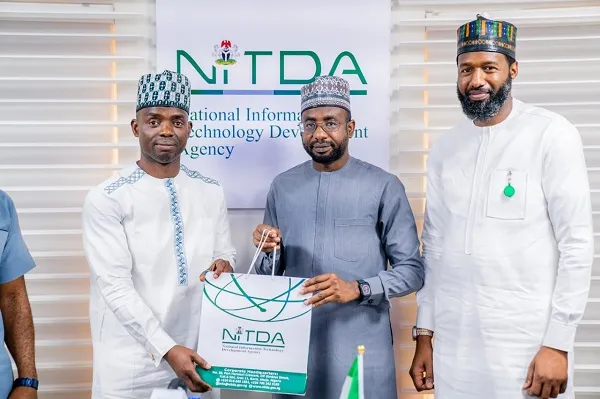National Information Technology Development Agency (NITDA) Director General Kashifu Inuwa has announced a partnership with the Small and Medium Enterprises Development Agency of Nigeria (SMEDAN) to promote digital literacy, infrastructure development, and other initiatives.
The two organisations will work together to create a database that will provide insights into current events and help direct interventions accordingly.
Forty million small businesses comprise SMEDAN in Nigeria, generating half of the GDP and employing seventy million people.
On Friday, while paying a courtesy visit to the Agency’s corporate headquarters in Abuja, the DG made this announcement to Charles Odii, the director general of SMEDAN.
This trip was about forming partnerships to help small and medium-sized enterprises (SMEs) in Nigeria with their infrastructure and human capital development. To further discuss the possibility of both agencies aligning and inviting DG NITDA to SMEDAN, it is recommended that they draft a memorandum of understanding (MoU).
Read also: NITDA bill not targeted at telecoms businesses – NITDA
What is attainable
Based on Inuwa’s research, NITDA and SMEDAN could work together to achieve goals in the NITDA Strategic Roadmap and Action Plan (SRAP 2.0), such as the first pillar’s emphasis on digital literacy and talent development.
He says the partnership will help small and medium-sized businesses (SMEs) improve their productivity by increasing digital literacy. In addition, he said, it lines up with the goal of the NDLF, or National Digital Literacy Framework.
According to the DG NITDA, this partnership is well-timed since it will improve the enforcement of laws and policies, such as the Nigerian Startup Act.
The partnership allows them to explore how SMEs can benefit from all the incentives within the Startup Act, according to Inuwa, who also mentioned that SMEs make up about 90% of the country’s workforce and more than 90% of businesses. People who use innovation to boost productivity or start businesses based on innovation are also their targets.
More than half of Nigeria’s 100 IT hubs are sitting idle, according to Inuwa, who cited the ISF. To promote inclusive access to digital infrastructure and services, he disclosed that both agencies can use these IT hubs as infrastructure for unserved and underserved areas. This aligns with a pillar of the SRAP 2.0.
They should also meet to establish a standard for how an IT hub should function for the benefit of the public.
Areas for adjustment
In order to strengthen cybersecurity and digital trust, he suggested that they consider how to develop cybersecurity solutions for small and medium-sized enterprises (SMEs). This would encourage digital trust by empowering SMEs to offer affordable, indigenous cybersecurity services.
They need to find ways to encourage innovation and entrepreneurship, he said, in order to cultivate a dynamic ecosystem that drives economic growth, which is another pillar that is focused on SMEs.
Bloc partners with SMEDAN to provide fintech to Nigerian SMEs
They were at NITDA to have their curriculum reviewed to make sure it aligns with the NDLF and meets global standards; earlier, Odii mentioned that the agency had started a couple of digital literacy programmes.
Concerning the Startup Act, Odii has stated that they are aware that NITDA serves as the act’s secretariat and would like to collaborate with you to raise awareness among small and medium-sized enterprises (SMEs), particularly startups, about the benefits of the act and how to register with your database.
He mentioned that they are currently working on a comprehensive database for small and medium-sized enterprises (SMEs), and they are hoping that the partnership can help them align its framework with resources available to data entrepreneurs.




